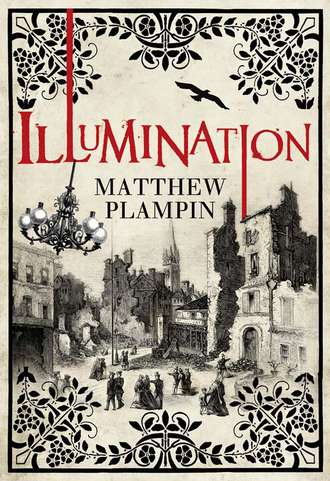
Полная версия
Illumination
Hannah made a disgusted sound and walked off towards Westminster.
‘Come now, Han,’ pleaded Clement, trotting behind her, ‘hold here for a minute more. You’ve got to look at it from her side. Every one of those fine gentlemen in there knows what she was, how famous and rich and so on. And every one of them knows where she is now. It’s a terrible humiliation for her, really it is.’
This was his regular line of reasoning and it had worked on many occasions. Elizabeth’s slide from glory, after all, had defined their lives. It had determined their transition to ever smaller houses, in less and less fashionable areas; the slow diminishment of their stock of valuables; the whittling of their domestic staff to a single elderly Irishwoman who washed the linen every other Wednesday. That evening, however, was different. Hannah felt it with unsettling clarity. Her brother’s appeals were not going to win her around.
‘I have been waiting for so very long for something to happen, Clem.’ The words came out heavily, slowing her to a stop. ‘She calls herself my best and closest ally. She loves to talk it up as a great cause – a battle waged for the whole of womankind.’ A hot tear collected against her nose. ‘And yet all she does are things like this.’
Clement put a hand gently on her shoulder. He did his best, telling her that she must not lose heart and that her persistence was bound to bring rewards, but he couldn’t begin to understand. He had no wind driving him – no desired destination in life. Clem was content merely to coast through a seemingly random series of projects that were often adopted and abandoned within the same week. His present fascination, for instance, was with the electric telegraph, leading to obscure experiments with currents and lengths of wire. This mechanical inclination was unprecedented among the Pardys. Knowing nothing of such matters, Elizabeth had left her son more or less alone – a lack of attention that had shaped his character as profoundly as her interference had shaped Hannah’s.
‘You must come back, Han, at any rate,’ he concluded, ‘to reclaim your cloak and hat.’
Hannah shook her head, wiping her eye on the cuff of her gown. Even this was unthinkable. Returning to her mother’s side was a certain return to disappointment, to antagonism and dispute. It was reducing her, wearing her thin. She could not go on with it; she refused to. In her bookcase, between Mrs Trollope’s Domestic Manners of the Americans and Mrs Jameson’s Sacred and Legendary Art, was an envelope containing nearly fifteen pounds, scraped together over the past few years. The purpose of this sum, only half-perceived before that evening, came to her with sudden force. Hannah looked along the river, away from London and everyone in it. She had to act.
I
The platform was packed with people, well dressed and wealthy for the most part, jostling for places on a train that was about to leave for the provinces. They yelled and shoved, hitting at one another with fists, canes and umbrellas. Banknotes, bribes for the attendants, were being waved in the air like a thousand tiny flags. To Clem, fresh from the Calais express with a valise in each hand, the scene was positively apocalyptic. He stopped and tried to get his bearings.
‘Head left,’ Elizabeth shouted in his ear, pushing him forward. ‘We want the rue Lafayette.’
The cab smelled of rice powder and a sickly citrus perfume. Clem heaved the bags up on the luggage rack and flopped into a corner, reaching inside his pocket for a cigarette. Opposite him, his mother had arrayed herself in her customary fashion: perched in the exact centre of the seat so that she had a clear view from both windows, with a notebook in her lap to record her observations. She began to write, lips slightly pursed, the pencil scurrying from one side of the page to the other and then darting back. Clem pulled open the window next to him and lit his cigarette. His ribs were sore, bruised most likely; he’d been elbowed a good few times as he struggled across the seething concourse.
‘Deuced keen to get off, weren’t they? One would think the city was already burning.’
‘Those who grew fat under the Empire,’ declared Elizabeth, ‘who benefited the most from all that corruption and carelessness, are scattering like geese now that something is being asked of them in return.’
‘Well,’ said Clem, ‘that’s certainly one way of looking at it.’
A vast military camp had been established in the streets around the Gare du Nord. Once-elegant avenues were choked with tents and huts, their trees stripped bare to fuel the fires that dotted the promenades, blackening the stonework with smoke. Soldiers sat in their hundreds along the pavements; peering down at them, Clem saw teenaged farmhands in ill-fitting blue tunics, their grubby faces vacant, rifles propped against their shoulders.
‘Lord above,’ he murmured, ‘there must be an entire division out here.’
Elizabeth glanced at the mass of infantry for a couple of seconds and then resumed her note-taking. ‘Efficiency must be our watchword,’ she said as she wrote. ‘We’ll meet with Mr Inglis, we’ll go to Montmartre to find her, and then we’ll bring her straight home. Do you hear me, Clement? The three of us will escape this city together.’
‘How much does your Mr Inglis know?’
‘Simply that I have some urgent business to attend to before this situation with the Prussians comes to a head.’ Her brow furrowed. ‘He isn’t someone I would necessarily choose to place my trust in, but the streets of Paris have been quite transformed since I last numbered among its residents. I doubt I could even find my way from the Madeleine to Notre Dame after Louis Napoleon’s barbaric interferences.’ She finished a page and flipped it over, the flow of words barely interrupted. ‘Mr Inglis, however, has lived on the rue Joubert for longer than anyone cares to remember. His assistance can only speed things along.’
The cab turned a corner, wheeling from sunlight into shadow; a detachment of field artillery clattered past, the crews shouting to each other from their positions on the mud-encrusted guns.
Clem had lost the taste for his cigarette. ‘Whatever’s best for Han,’ he said, leaning forward to drop it out of the window.
They carried on into the heart of fashionable Paris. Clem marvelled at the crisp geometry of the streets, the monumental ranks of six-storey buildings, the endless rows of tall, identical windows; to one used to the crumbling muddle of London, the effect really was staggering. A neat enamelled sign, its white letters set against a peacock blue ground, informed him that they had reached the boulevard des Capucines, generally considered to be among the most splendid of the emperor’s recent redevelopments. It had been kept free of soldiers, but in their place was an atmosphere of singular desolation. The magnificent shops had their shutters down and their awnings rolled; the gutters were clogged with mud and litter; the strolling, stylish crowds had long since fled. Hardly anyone at all could be seen, in fact, and Clem searched about in vain for a porter when they alighted before the Grand Hotel. Elizabeth went inside directly, pushing apart the heavy glass doors, leaving him to pay their driver and carry the bags.
Clem had friends who swore by the Paris Grand, waxing lyrical about its delightful society and many modern luxuries. That afternoon, though, it was like stepping into the atrium of a failing bank, the air charged with impending disaster. The crystal chandeliers were turned down low to conserve gas. Several of the public rooms had been roped off, the main bar was closed and a sign in front of the lifts informed guests in four languages that they were out of use until further notice. Only a handful of people were passing time there; exclusively male, soberly dressed or in uniform, they conversed quietly over their coffee cups.
Elizabeth was standing by the reception desk with a tallish man at her side. Some way past forty, with a sandy beard, he was wearing a green yachting jacket and shooting boots. He’d just kissed her hand and had yet to release it; she’d adopted a classic, much-employed pose, angling her head carefully to display her nose and jaw-line to their best advantage. Both were smiling.
‘Mr Montague Inglis of the Sentinel,’ Elizabeth said as he arrived before them. ‘Mont, this is Clement Pardy, my son.’
Clem knew the Sentinel. A popular, rather frivolous paper with pretensions to being upmarket, it catered to those who aspired to a life of dandified loafing. He studied Mr Inglis more closely. The journalist’s practical costume was belied by the costly gloss of his boot leather, the expert barbering of his beard and the diamond in his tiepin: the size of pea, this stone was surely worth more than the Pardy family had to its name. Clem set down the bags and the two men shook hands. Inglis’s oar-shaped face was strangely vicarish, but weathered by fast living; his probing, watery eyes appeared to be running through some unknown calculation.
‘Heavens,’ he said, his voice low and slightly hoarse, ‘the last time I saw this young buck he was still messing his britches. First trip to La Ville-Lumière, Clement?’
‘It is, Mr Inglis.’
‘Damn shame – it’ll very probably be your last as well.’ The journalist switched his attention back to Elizabeth. ‘My dear Mrs P, I must insist that you tell me more about why you’ve picked this moment for a visit. You are aware, I take it, that my poor Paris is doomed?’
He said this casually, as if confirming a dinner arrangement. Elizabeth’s response was equally light-hearted; she twisted a dyed curl around her finger as she spoke, resting her elbow against the reception desk.
‘That would seem to be the case, Mont, would it not? Why, in all my travels I have never seen so many blessed soldiers!’
‘Yes, the boulevards have been quite defaced by that godforsaken rabble. Awfully depressing. And the Grand! My God, look at the place! A brilliant company used to assemble here every evening for champagne, billiards, some gossip before the theatre; now they’re all either on the wing or in uniform, out filling sandbags by the city wall.’ Inglis clapped his hands, raising his voice in sardonic triumph. ‘Another capital result for the new republic! Vive la France! Vive la liberté! Bless my soul, I hope that villain Favre and the rest are pleased with what they’ve accomplished.’
Elizabeth’s smile had grown strained. They were political opposites, Clem realised, despite the show of friendship; Inglis was a supporter of the Empire whose collapse at the beginning of the month had brought his mother such satisfaction. This flirtatious performance would only withstand so much before she felt compelled to strike out. Clem decided that he would change the subject.
‘What news of the Prussians, Mr Inglis?’ he asked. ‘How close do the latest reports put them?’
Inglis ignored him. ‘Madam, I do believe that you have yet to answer me. Why are you in Paris? Is it a new project, a new Mrs Pardy volume after all these years of inaction, so tormenting for your public? An account of my city’s final hours, perhaps?’
Elizabeth was being goaded; her laugh had an edge. ‘Goodness no, this is not a writing expedition. I am here for my daughter, Mont. Hannah, Clement’s twin. She lives in Paris – has done so for nearly two and a half years.’
Inglis was unconvinced, but he let the matter go for now. ‘Is she married to a Frenchman? An Englishman with business interests over here?’
‘No, she is not.’
‘A school, then – some manner of ladies’ college?’
Clem dipped his head, squinting at his boots; they looked scuffed and cheap against the Grand’s patterned marble floor. This Mr Inglis knew very well that Han had run away to Paris and was feigning ignorance so that Elizabeth would have to recount the details for him. For all his sociability he was trying to embarrass her.
Elizabeth, however, refused to be embarrassed. ‘Hannah is a painter,’ she said, her nose lifting, ‘of quite extraordinary ability. She came here because she felt that female artists are taken more seriously in France than in England. She had – she has my complete support.’
Inglis took this in. ‘And she wishes to return home, does she, to escape the coming trials?’
‘I honestly don’t know,’ Elizabeth replied, remaining matter-of-fact. ‘She hasn’t contacted us for some months now. But we did receive this.’
She nodded at Clem, who reached inside his jacket for the letter – a single sheet covered on both sides with measured handwriting, making its case, in English, with eloquent directness. Both of them knew it almost word for word. Hannah was out of money, it claimed, friendless and destitute, trapped in Paris as the city faced a devastating ordeal that it might not survive. Her nationality would be no guard against a rain of explosive shells, or the lances of the Uhlans as they charged along the boulevards. They were her last and only chance; if they had any love for her they would go with all haste to No. 34 rue Garreau, Montmartre, Paris. It was unsigned, and offered no clues as to the author’s identity.
‘That is what brought us to Paris, Mont,’ Elizabeth said. ‘That is why we’re taking this risk.’
Inglis skimmed the letter, a corner of the page pinched between his immaculately manicured fingertips. ‘She is in Montmartre,’ he said.
‘A recent change. The address we had for her was in the Latin Quarter. I don’t know why she has moved.’
The journalist handed the letter back to Clem, as one might to a butler. ‘Dear lady, you’re in luck. I’m well acquainted with the 18th arrondissement and would be happy to accompany you on this mission of yours. I was up there only yesterday afternoon, in fact, to pay a call on a photographer I know – an associate,’ he added, ‘of the great Nadar.’
Clem had been hoping that Mr Inglis would reveal himself to be of no use, allowing them to dispense with him and get on with their search alone. Now, though, he regarded the Sentinel’s correspondent with new curiosity. Photography was among his keenest interests; he’d even thought for a while last winter that he might have a proper go at it, until he’d discovered the prohibitive cost of the materials. Still, Nadar was a big beast – among the very biggest.
‘Have you met Nadar, Mr Inglis?’ he enquired, trying not to sound too impressed. ‘Have you been to his studio?’
Again, Inglis acted as if Clem hadn’t spoken. He turned towards the reception desk. No clerk could be seen. There were signs of neglect; dust was gathering in the pigeonholes and the brass counter-bell was dappled with fingerprints.
‘Do you have a reservation?’ he asked Elizabeth.
‘We do, but I doubt we will sleep here. We are intending to be on the early-morning train back to Calais. With Hannah.’
‘Wise, Mrs P, very wise. The Prussians will soon be blocking the railway lines. I understand that it’s an initial stage in the process of encirclement.’ Inglis straightened up. ‘I’m rather surprised, actually, that it didn’t happen this afternoon.’
Clem stared over at Elizabeth. She’d predicted confidently that it would be two more days before the invaders reached Paris. He felt sick, his collar tightening. This was a mistake of epic proportions. What on earth did they think they were doing?
Elizabeth remained composed. ‘Is that possible?’ she asked, sounding only mildly irked by the journalist’s revelation. ‘Can a city that is home to millions really be placed under siege? Is this some kind of joke, Mont?’
Inglis was grinning. ‘No joke, Mrs P, upon my honour. All the experts are agreed. The Prussians are more than capable of organising such an operation. That is why the French have been crushed so absolutely – why their best legions have been knocked to bits in a matter of weeks. This is the modern way, you see. Valour and courage have been displaced by planning and logistics.’
‘It seems improbable, to say the very least.’
‘Perhaps, madam, but the strategies are well established. Roads will be barricaded, batteries built, trenches dug. They’re going to lock us in, starve us down to nothing, and deliver a final humiliation so complete that the new republic will submit to whatever peace terms they propose.’ Inglis struck the counter-bell, its sharp chime cutting through the lobby. ‘The siege of Paris is about to begin.’
Evening had arrived whilst they’d been in the Grand. Ornate cast-iron lampposts lit expanses of empty pavement; a soft autumn mist was drifting down through the denuded trees. Inglis hailed them a cab, stopping to give the driver his instructions as Clem and his mother climbed inside. Elizabeth had entrusted Clem with her notebook; he went to draw it from his pocket and pass it over to her.
‘No, Clement,’ Elizabeth said, ‘I fear that would only provoke him. Lord above, I’d forgotten how trying the man can be. Memory is too forgiving at times.’
‘He isn’t easy to like, I have to say.’
‘Liking him isn’t necessary. He might be able to help us locate Hannah. All we have to do is put up with him until then.’
Inglis folded his long limbs into the cab, settling himself at the opposite end of Clem’s seat. The journalist was in high spirits, glad to have been liberated from the dullness of the Grand. He took a squashed-looking cap from his jacket and stuck it on his head. It was a kepi, he informed them, headwear of choice for partisans of the new republic – which made it an essential item for any man who wished to walk about the city and not be lynched either as a Prussian spy or an Imperialist.
‘The latter,’ he confided, ‘for the shabbier class of Parisian, is by far the more grievous offence.’
They went north, passing through yet more roadside army camps, the fires now casting tangled shadows over the fine buildings behind. Inglis held forth on the incompetence of the new republic, the destructive savagery of the masses, the immense wrongs done to the noble, fallen emperor; Elizabeth stayed very still, gazing out of the window.
Entering Montmartre felt abrupt, like walking behind a section of stage-set. The scale and precision of the boulevards disappeared, the cab creaking its way up into a web of crooked, sloping lanes. No one had fled this district; Montmartre was truly alive that night, crammed with its inhabitants. The mood was oddly jubilant, the erratically lit streets resounding with songs and laughter. Every man was in uniform, but not one worn by any of the regular troops; their simple blue outfits were halfway between those of soldiers and policemen, topped off with a kepi just like Inglis’s. The majority were drinking hard. They dominated the cafés and restaurants, debated on corners and lounged around shop fronts. Countless flags and banners were on display. The tricolour was the most popular – but another, plain red, was so common that it could easily have been mistaken for the standard of a new army, separate from that of France.
‘National Guard,’ Inglis said, his voice loaded with disdain. ‘The Parisian militia. Louis Napoleon had the good sense to suppress them, but they’re back with a vengeance now, claiming that they’re the ones to save the city.’ He pointed at a particularly large red flag, propped above the door of a bar. ‘And as you can see, in humble districts such as this, the units are already thoroughly infected with socialistic doctrine.’
‘The International?’ Elizabeth asked.
‘Among others. Reds of every stripe were all over Paris the moment the emperor was captured, spreading their sedition – sowing disinformation and slander.’ Inglis smiled bitterly. ‘Disaster piled upon disaster.’
The cab became caught in a herd of goats that was being driven into the city from the surrounding countryside. Inglis opened the door, leaned out to survey the brown, bleating backs, and suggested that they continue on foot.
‘I know the way from here, Mrs P,’ he said. ‘It ain’t far.’
Skirting the herd, he led them up a steep alley and across a courtyard. A good deal could be seen of the hilltop village Montmartre had been before it was swallowed by the expanding capital. Many of the houses were little more than cottages; whitewashed walls hemmed in gardens and orchards. Between a butcher and a tool shop Clem caught a glimpse of a broken-down windmill, the sails silhouetted against the darkening sky.
The rue Garreau lay a short distance beyond the courtyard. No. 34 was one of the larger buildings upon it, standing at the junction of two quiet backstreets, its floors stacked untidily like books on a scholar’s desk. A portly, middle-aged woman in a grey dress was climbing down from a stool, having just lit the gas lamp above the door. Noticing their purposeful approach, she wiped her hands on her apron and prepared to meet them. Inglis began to speak, assuming command, but Elizabeth stepped smartly in front of him. They had arrived at Hannah’s address; his usefulness was almost at an end.
Elizabeth bade the woman good evening and launched into a double-time explanation of their presence in Montmartre. Her French had remained remarkably fluent – whereas Clem’s, only ever schoolroom level, had rusted to the point of uselessness. Following the conversation was a struggle, but he managed to grasp that this woman was Hannah’s landlady – a Madame Lantier. Utterly overawed by Elizabeth, she was listening closely to what she was being told, her eyes open wide. She’d realised that they were relations of Hannah’s due to the family resemblance, the blonde hair and so forth, and that they had travelled to Paris to effect a reunion; Elizabeth’s talk of her tenant being in some kind of distress, however, came as a complete surprise.
‘Les Prussiens, oui, c’est très grave, mais Mademoiselle Pardy …’ Madame Lantier shrugged. ‘Mademoiselle Pardy est la même.’
Elizabeth shot Clem a glance; this was not the author of their mysterious letter. She asked another question and an agreement was reached, the landlady nodding as she turned to open her front door.
‘She’ll show us Hannah’s room,’ Elizabeth said. ‘The blessed girl isn’t there, of course – she’s off in the city somewhere. But Madame hasn’t noticed anything wrong at all.’
Clem considered this as they followed Madame Lantier into her hallway. It made sense that she was unaware of his sister’s troubles. Who would want their landlady to know that they were out of cash, if they could possibly help it?
They were taken past the main staircase, through a pristine parlour and outside again, into the walled garden at the rear of the house. The air smelled of autumnal ripeness, of fat vegetables and soil; an abundance of tall plants thronged around a brick pathway, their leaves turning blue in the fading light. Madame Lantier had already started up this path, pushing through the press of vegetation. A little bemused, Elizabeth, Clem and Inglis went after her, holding onto their hats to stop them being dragged from their heads. After a few awkward yards they were back in the open. In front of them, set against the garden’s rear wall, was a small wooden outbuilding. The landlady was at the door, fumbling with keys.
‘Good Lord,’ Elizabeth exclaimed, ‘Hannah is living in a shed.’
The interior reeked of linseed oil, acrid and disagreeable after the sweet scents of the garden. It was dark; the single high window had been firmly shuttered. Clem could just discern a table, a stove, several easels and a number of black rectangles he took to be canvases.
‘Stay where you are, Mrs P,’ instructed Inglis. ‘Madame has found a lamp.’
An oil flame flared, illuminating the modest room and the hoard of paintings it contained. There were views of sunlit boulevards, of cafés buzzing with people, of skiffs on the Seine – of Paris in 1870. The compositions were irregular, lop-sided, done with apparent disregard for both the conventions of picture-making and the symmetries of the remade city. Clem took a few steps towards one of the larger boulevard scenes. The image grew less precise the nearer he got to it. He saw how little detail there was, and how few definite lines; its forms were on the verge of coming apart, of dissolving into each other. Brush marks had been left openly visible throughout. Buildings were pale tracks of grey; trees feathery flurries of green and yellow; the crowds on the pavements nothing but a profusion of intermingled smears. Madame Lantier carried the lamp to the table. The light glistened across the surface of the canvases, catching on tiny beads and ridges of pigment.







